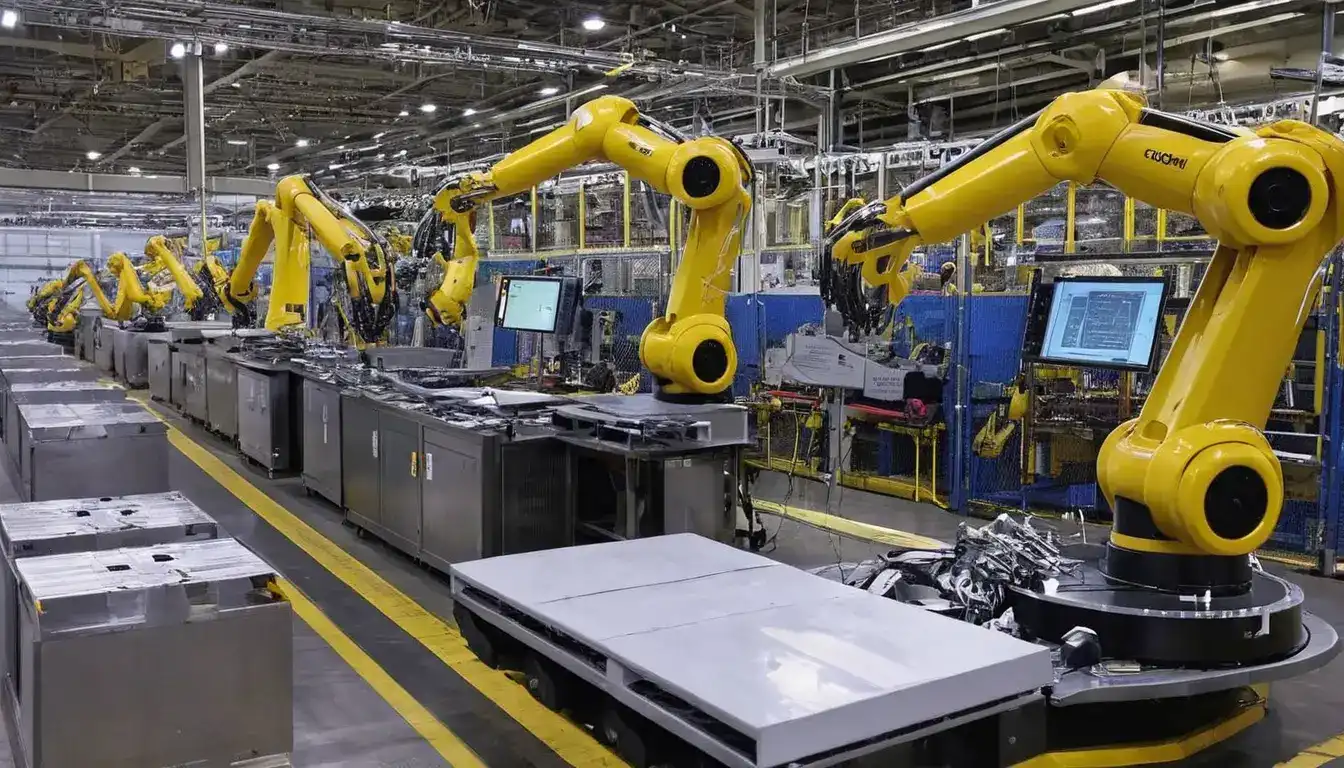Optimize Your Supply Chain
Emily Willis

Photo: Optimize Your Supply Chain
Optimize Your Supply Chain: A Comprehensive Guide for Business Success
In today's fast-paced and interconnected world, the efficiency of a business hinges significantly on the strength of its supply chain. From the moment raw materials are sourced to the final delivery of a product to a customer, every step presents an opportunity for improvement. Optimizing your supply chain isn't just about cutting costs; it's about building a robust, agile, and resilient system that can navigate challenges, satisfy customers, and drive sustainable growth.
This article will delve into the critical aspects of supply chain optimization, exploring why it's more crucial than ever and providing actionable strategies to enhance your operations. Whether you're a small business owner or part of a large corporation, understanding and implementing these principles can unlock significant competitive advantages.
What Exactly is Supply Chain Optimization?
At its core, supply chain optimization (SCO) is the process of improving the efficiency and effectiveness of every point within your supply chain, from suppliers and manufacturers to warehouses and inventory, right through to product delivery to customers. It involves streamlining processes, minimizing waste, reducing lead times, and ultimately maximizing customer satisfaction while lowering overall costs.
Think of your supply chain as a complex network of interconnected activities. Optimization aims to find the most cost-effective and efficient ways to manage the flow of goods, information, and finances across this entire network. This holistic approach ensures that your supply chain operates at peak performance.
Why Is Optimizing Your Supply Chain Crucial Today?
The global market is characterized by constant change, from fluctuating demand and geopolitical shifts to technological advancements and evolving consumer expectations. In this dynamic environment, an optimized supply chain is not merely a competitive advantage; it's a necessity for survival and growth.
Here's why prioritizing supply chain optimization is more vital than ever:
Cost Savings
One of the most immediate and tangible benefits of supply chain optimization is significant cost reduction. By eliminating redundancies, minimizing lead times, and optimizing inventory levels, businesses can drastically cut down on operational expenses. This includes reducing warehousing costs, logistics expenses, and labor costs through process automation. For instance, logistics costs alone can account for a substantial portion of total supply chain management costs in some companies.
Improved Customer Satisfaction
An optimized supply chain ensures that products are available precisely when and where customers need them. This translates to faster, more accurate deliveries and fewer stockouts, directly leading to higher customer satisfaction and retention rates. In today's market, timely delivery and product availability are paramount to meeting increasing customer expectations.
Enhanced Resilience
Recent global events have underscored the critical need for supply chain resilience – the ability to anticipate, prepare for, respond to, and recover from disruptions. An agile and optimized supply chain can adapt to unforeseen circumstances like natural disasters, geopolitical issues, or sudden demand changes, maintaining the flow of goods and minimizing impact. This involves strategies like diversifying suppliers and routes, establishing real-time tracking, and centralizing information.
Competitive Advantage
In a competitive landscape, an optimized supply chain allows a business to be more agile and responsive to market conditions and consumer demands. This agility enables companies to ensure supply chain sustainability, quickly adapt to changes, and seize new opportunities, ultimately gaining a significant edge over competitors.
Increased Revenue and Profitability
Ultimately, the combination of reduced costs, improved efficiency, and higher customer satisfaction leads to increased revenue and profitability. By delivering the right product to the right customer at the right time, organizations can boost customer retention and re-ordering, directly impacting their bottom line.
Key Pillars of Supply Chain Optimization
Achieving an optimized supply chain involves focusing on several interconnected areas. These pillars form the foundation of an efficient, resilient, and responsive operation.
Strategic Planning & Forecasting
Effective planning is the bedrock of supply chain optimization. It involves understanding your long-term business goals and how your supply chain can support them.
- Demand Forecasting: Accurately predicting future customer demand is crucial for balancing supply with demand and avoiding both surplus and shortage. Businesses use various methods, including historical data analysis, market research, and advanced machine learning models, to anticipate demand. AI-powered tools can analyze vast datasets to identify patterns and trends that human analysis might miss, leading to more precise forecasts.
- Sales & Operations Planning (S&OP): This integrated business management process helps align sales, marketing, production, and supply chain functions to meet demand efficiently. Collaboration across departments is vital for successful S&OP.
Efficient Inventory Management
Maintaining optimal inventory levels is a delicate balance. Too much inventory ties up capital and incurs holding costs, while too little can lead to stockouts and lost sales.
- Just-in-Time (JIT) vs. Safety Stock: The JIT approach aims to reduce holding costs by receiving goods only as needed, minimizing stored inventory. However, for resilience, some businesses also maintain "safety stock" – a buffer against unexpected demand spikes or supply disruptions.
- Technology for Inventory Control: Modern inventory management software provides real-time tracking, automated reordering, and robust reporting and analytics. Tools like barcode systems and RFID technology enhance accuracy and visibility. Regular audits and cycle counting are also essential practices to ensure inventory accuracy.
Streamlined Logistics & Distribution
Logistics encompasses the movement of goods from suppliers to customers, including transportation, warehousing, and distribution. Optimizing these processes can significantly reduce costs and improve delivery times.
- Transportation Optimization: This involves optimizing routes, loads, and modes of transport to reduce costs and transit times. Dynamic route planning software can make real-time adjustments based on factors like traffic and weather, enhancing efficiency and delivery speed.
- Warehouse Management: Efficient warehouse design and operation are critical. This includes optimizing storage space, picking processes, and leveraging automation and robotics for improved efficiency.
Strong Supplier Relationships
Suppliers are integral to your supply chain, and fostering strong, collaborative relationships can lead to mutual benefits, including better terms, improved quality, and innovation.
- Collaboration and Communication: Open and consistent communication with suppliers is fundamental. This involves regular meetings, sharing performance feedback, and even involving suppliers in early decision-making or product development.
- Risk Mitigation: Work closely with suppliers to identify and mitigate potential risks, such as operational, financial, or geopolitical issues. Diversifying suppliers (multisourcing) can also reduce dependency on a single source and enhance resilience.
Leveraging Technology for an Optimized Supply Chain
Technology is no longer just a support function; it's a transformative force in supply chain optimization. Digital transformation allows for unprecedented visibility, collaboration, and control.
- AI and Machine Learning (ML): These technologies enable advanced analytics, predictive modeling, and automation. AI can refine demand planning, optimize inventory forecasting, and even automate repetitive tasks, leading to better decision-making and efficiency.
- Blockchain: Offers end-to-end traceability and transparency, providing a secure and immutable record of transactions across the supply chain.
- Internet of Things (IoT): IoT devices provide real-time tracking of goods and shipments, allowing for immediate identification of delays or issues.
- Supply Chain Software: Integrated software solutions connect the entire manufacturing and distribution value chain, offering a complete view and enabling better decision-making from procurement to delivery.
Actionable Steps to Begin Your Supply Chain Optimization Journey
Optimizing your supply chain is a continuous journey, not a one-time project. Here are practical steps to get started:
- Conduct a Comprehensive Audit: Before making changes, thoroughly analyze your existing supply chain. Identify pain points, bottlenecks, inefficiencies, and areas for improvement. This includes reviewing processes, infrastructure, technology, and performance metrics.
- Set Clear Goals: Define what you want to achieve with optimization. Are you aiming for cost reduction, faster delivery times, improved sustainability, or enhanced resilience? Clear, measurable objectives are essential for success.
- Embrace Data Analytics: Data is your most valuable asset. Implement tools and processes to collect, organize, and analyze data from every stage of your supply chain
Latest ✨
View AllDitch stressful tests! Gamified assessment makes evaluations fun, fair & future-ready. Unlock true potential with engaging, insightful methods.
Emily Willis
secrets to mastering your business financial plan with five simple steps. Learn how to analyze financial data, set measurable goals, and create a comprehensive strategy for success. Unlock profitability, make confident decisions, and ensure a bright future for your business
Emily Willis
Europe is full of rich culture, with ten cities offering enriching cultural experiences. From the romance of Paris to the splendor of Rome and the artistic flair of Barcelona, each city has its own unique charm and heritage.
Emily Willis
invitation to go on a wildlife safari through Kenya, Tanzania, and Australia. It describes the unique wildlife encounters in each country, such as witnessing the Great Migration in Kenya, exploring the Serengeti in Tanzania, and encountering koalas and kangaroos in Australia.
Emily Willis
Business
View All
June 9, 2025
Innovation Strategy for Future BusinessInnovation is vital for future business success. Learn why a robust strategy ensures survival, growth, and competitiveness in a changing world.
Emily Willis

June 8, 2025
Importance of Corporate GovernanceCorporate governance isn't just for boardrooms. Understand its vital role in ethical business, trust, and sustainable growth for all stakeholders.
Emily Willis

June 9, 2025
Succeed with SaaS Business ModelMaster the SaaS business model! This guide reveals strategies for building a thriving enterprise, from understanding the landscape to achieving product-market f...
Emily Willis
Economy
View AllUnpack the immense power of central banks and how they're held accountable for shaping the economy and your financial life.
Read MoreTechnology is now an integral part of our daily lives and economies, driving innovation, boosting productivity, and fueling economic growth. It streamlines research and development, facilitates collaboration, automates mundane tasks, and democratizes innovation.
Read MoreThe inflation threat explained. Understand its causes and discover effective cures to protect your purchasing power and navigate economic challenges.
Read MoreEntertainment
View All
August 5, 2024
Classic Films: Timeless Masterpieces in the Age of StreamingClassic films may seem outdated in today's world of instant gratification and endless streaming options, but they offer enduring stories, masterful storytelling, historical insights, technical innovation, and artistic value that surpass modern offerings. While classic films face challenges such as accessibility and pacing, there are ways to overcome these obstacles, such as using streaming services, visiting local libraries, attending film festivals, and utilizing online resources.
Emily Willis

August 4, 2024
The Latest Music Trends, Artists Influencing Pop Culture, and How Digital Platforms Facilitate the Distribution of Music GloballyThe music industry is constantly changing due to consumer preferences, technology, and the influence of artists. Digital platforms have revolutionized music creation, distribution, and consumption, leading to genre fusion, the rise of independent artists, and collaborative projects. Influential artists like Billie Eilish, BTS, and Taylor Swift have shaped pop culture globally. Streaming services, social media, and direct-to-fan engagement have transformed music distribution. Digital platforms also promote cultural diversity and inclusivity, expand markets and revenue, and drive technological advancements. The industry is also focusing on sustainability and ethical practices. To succeed in the future, stakeholders must embrace digital transformation and champion inclusivity.
Emily Willis

August 5, 2024
Entertainment in Society: Social Impact, Cultural Influence, Economic ContributionsEntertainment is more than just a way to pass the time it has a significant impact on society, culture, and the economy. It promotes empathy, sparks conversations, and drives social change. It reflects and shapes cultural trends, while also preserving traditions. The entertainment industry generates jobs, contributes to economic growth, and drives technological innovation.
Emily Willis
Health
View AllRegular exercise is essential for maintaining both physical and mental health. It helps with weight management, cardiovascular health, muscle strength, energy levels, and sleep quality. Exercise also reduces stress and anxiety, improves mood, cognitive function, and self-esteem, and lowers the risk of depression. Different types of exercises, such as aerobic, strength training, flexibility, balance, and mind-body exercises, contribute to overall health. To start and maintain an exercise routine, it is important to start slowly, set realistic goals, find enjoyable activities, stay consistent, and listen to your body.
Emily Willis
Maintaining good health involves a balanced diet that provides essential nutrients for the body. A balanced diet includes carbohydrates, proteins, fats, vitamins, minerals, fiber, and water. Benefits of a balanced diet include enhanced energy levels, improved mental health, a stronger immune system, better weight management, reduced risk of chronic diseases, and enhanced digestion. Components of a balanced diet include fruits and vegetables, whole grains, protein sources, dairy or dairy alternatives, and healthy fats. Tips for maintaining a balanced diet include planning meals, portion control, staying hydrated, limiting processed foods, eating mindfully, and including physical activity.
Emily Willis
sleep for physical and mental well-being, discussing the benefits of sleep such as physical restoration, brain function, emotional regulation, concentration, and reduced risk of chronic diseases. It explains the different stages of the sleep cycle and provides guidelines for how much sleep individuals of different ages need.
Emily Willis
Trending 🔥
View All
1
2
3
4
5
6
7
8
9
10
Sports
View AllAugust 5, 2024
Celebrating Sports Legends: Honoring Iconic Figures and Their Enduring Impact
Read MoreAugust 4, 2024
The Importance of Mental Training and Psychological Strategies in Helping Athletes Reach Their Peak Performance on the Field
Read MoreTechnology
View All
August 4, 2024
AI-Powered Robots Take Over Manufacturing Jobs: Is Our Workforce Prepared?
AI-powered robots are transforming the manufacturing industry, leading to increased efficiency and improved product quality. While concerns about job displacement exist, AI is more likely to transform jobs rather than eliminate them.

August 5, 2024
Challenges and Opportunities in Implementing IoT Technology
The Internet of Things (IoT) is revolutionizing industries by enabling real-time monitoring, automation, and decision-making. However, implementing IoT technology comes with challenges such as security concerns, interoperability issues, data management, scalability, and cost. Despite these challenges, IoT offers opportunities for operational efficiency, enhanced customer experience, innovation, environmental sustainability, and business intelligence.

August 5, 2024
Tips for Keeping Your Personal Data Safe on the Internet
The digital age has made personal data more vulnerable to threats such as phishing, hacking, identity theft, and data breaches. To protect yourself, it is important to create strong passwords, be cautious of phishing attacks, secure your devices, safeguard your personal information online, practice safe online shopping and banking, protect your social media accounts, and stay informed about cybersecurity threats.

August 5, 2024
The Future of Cybersecurity and Upcoming Challenges
cybersecurity in the digital age, highlighting key trends and challenges that will shape the future of cybersecurity. It addresses issues such as the increased use of AI and ML, the growth of IoT devices, ransomware attacks, cloud security, and supply chain attacks. It also outlines upcoming challenges in cybersecurity, including talent shortage, regulatory compliance, cybersecurity for remote work, quantum computing, and social engineering attacks.





















